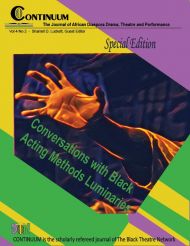Mourning, Orature, and Memory: Cultural Performativity as Historiography in Pearl Cleage’s A Song for Coretta
Khalid Yaya Long
Abstract
This essay explores how Pearl Cleage’s play, A Song for Coretta, engages with certain paradigms of cultural performativity, namely mourning, orature, memory, and history. In doing so, the play is explored through theatre, performance, and cultural theories. Analyzing the play in this manner, it can be critically seen how Cleage joins fellow playwrights in their use of playwriting as historiographical method to document the African American experience.
Mourning, Orature, and Memory: Cultural Performativity as Historiography in Pearl Cleage’s A Song for Coretta
Knowing grief and expressing sorrow are central to the process of self-actualization.
All over the world, women play a central role in public expressions of mourning.
– bell hooks
Introduction
In A Song for Coretta, the central action takes place at the public memorial for the First Lady of the Human Rights Movement, Coretta Scott King. Playwright Pearl Cleage has illumined the Black experience from a relatively narrowed perspective through her dramatization of five African American women patiently waiting in line to view the body of King. By and large, the perspective can safely be placed under the scope of a womanist positionality. Individually, the women have been asked why they've each come to mourn the late ancestor – particularly, when they've never even met her. In order to answer the question, the women must recall their past. As they tell their personal histories through oral tradition, thereby evoking a West African practice of remembering and documenting, collectively they situate their memories within the social, political, and cultural context of African American history.
This essay explores how Pearl Cleage’s play, A Song for Coretta, engages with certain paradigms of cultural performativity, namely mourning, orature, memory, and history. In doing so, I examine the play through theatre, performance, and cultural theories. Analyzing the play in this manner, I critically survey how Cleage joins fellow playwrights in their use of playwriting as historiographical method to document the African American experience.
While Coretta’s public memorial is a multi-dimensional space to celebrate her life and accomplishments, and simultaneously mourn her loss, Cleage depicts her characters as mourning a loss while engaging with the concept of embodied experiences. The embodiment of such experiences is a mesh of history, memory, ritual, and future correlations thereof. Specifically, this space inhabits a phenomenological moment where the oral testimonial exchanges between the women serve not only as recognitions of history and enactments of memory, but even more emphatically, the collectiveness of the women’s testimonies serve as a search for identity and unity through sisterhood.[1]
The objective in this essay is to examine how Cleage engages with certain paradigms of cultural performativity. My use of the term cultural performativity is used here to embrace and be inclusive of the theory of embodied practices. For the purpose of this essay, these practices, or rather performances encompass chiefly: mourning, orature, memory – which, inherently, all lie at the helm of history. In reading the play through several critical lenses, my goal is to discuss each of the previously listed tropes within African American culture as historiographical method to document African American experiences.
Mourning Coretta, Mourning Self
As A Song for Coretta opens, Zora Evans, a twenty-two year old senior at Spelman College appears on the stage speaking into a recording device. Due to the nature of her speech, the audience can safely assume that she is a journalist or news reporter. More importantly, it is the message of her speech that sets up one of the primary themes of the play, mourning Coretta Scott King:
ZORA. It is a cold and rainy night outside of historic Ebenezer Baptist Church, but that doesn't seem to matter to the hundreds of people from all walks who have left the warmth of their homes and come here to say goodbye to Coretta Scott King…a woman they have never met. For those born after the civil rights era who never experienced the sit-ins and freedom rides and marches, it is difficult to understand what motivates these patiently waiting people to stand hour after hour for the briefest glimpse of a stranger…some simply said that she was a great lady. Others, that she was the heart of the civil rights movement. Some said they just wanted to be a part of history. Witnesses to the end of an era. Whatever their reasons, they have all been deeply touched by something they cannot define...[2]
Read the rest of this article in the PDF version. View PDF ![]()


